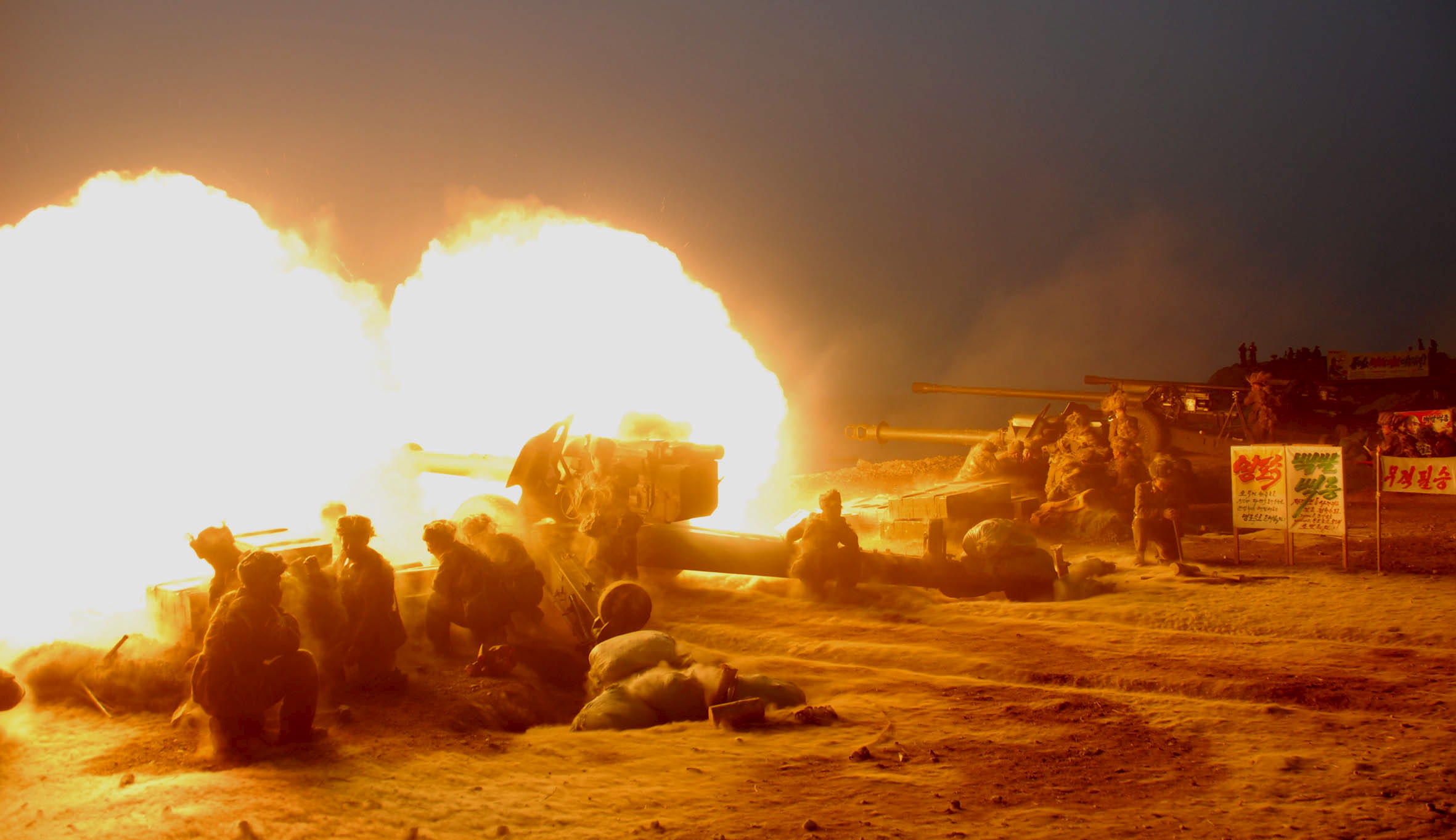After North Korea attacks: An ominous Asian future imagined
It's terrifying to contemplate. But we must.


A free daily email with the biggest news stories of the day – and the best features from TheWeek.com
You are now subscribed
Your newsletter sign-up was successful
With the world's collective gaze — and most certainly U.S. surveillance satellites — fixed on North Korea's next potential nuclear test, it is past time to consider the horror that the so-called "hermit kingdom" could inflict on its neighbors if it actually went to war.
Thanks to one of the largest standing armies on the planet — with over 1.2 million men under arms and another 7.7 million in reserve — and with chemical, biological, and nuclear weapons carried by over 1,000 missiles, Pyongyang has the capability to kill millions of people and start a conflict that could quickly escalate into the next global catastrophe.
How might such a war begin? The likely spark would involve some sort of unexpected crisis. For example, let's say in the not-too-distant future a North Korean missile veered off course and crash landed in the outskirts of Seoul, killing several hundred people in a tragic accident. South Korea would be hard pressed not to respond. In this fictional tale, Seoul would strike back with a missile of its own, destroying the North Korean launcher and crew responsible.
The Week
Escape your echo chamber. Get the facts behind the news, plus analysis from multiple perspectives.

Sign up for The Week's Free Newsletters
From our morning news briefing to a weekly Good News Newsletter, get the best of The Week delivered directly to your inbox.
From our morning news briefing to a weekly Good News Newsletter, get the best of The Week delivered directly to your inbox.
This is where things could get ugly. Kim Jong-Un would face a dilemma. If he were to do nothing, he would look weak in front of his generals and North Korean elites. Doing nothing could be the catalyst for regime change from within, something Kim is clearly worried about considering the many ordered executions he has carried out over the last several years. Afraid to look weak at home, Kim might well launch a massive retaliatory strike, which would be horrible for the region and world. Or he might instead decide to carry out a test of North Korea's most prized weapon of war in a show of sheer strength: an intercontinental ballistic missile that has the potential of hitting the U.S. homeland with a nuclear weapon.
This is where things really get ugly. U.S. naval-based missile defenses in the Pacific Ocean would, on the orders of President Trump, take the North Korean missile down — but not before Washington infected the missile's guidance system with malware, as a type of insurance policy. Thanks to the malware, the missile would likely go off course, perhaps getting dangerously close to Japanese airspace. Japan would (rightfully) be freaked out. Prime Minister Shinzo Abe would reach out to Washington, formally requesting the purchase of tomahawk cruise missiles — giving Japan the capability to take out Pyongyang's missiles on the launch pad next time.
The pressure on Kim to up the ante would be intense, particularly because China might finally bow to international pressure and cut off Kim. Perhaps that means reducing shipments of oil and fuel supplies. Such a move by Beijing — which supplies most food and natural resources to the north — would cripple the Kim regime.
With the very existence of the Kim family dynasty in jeopardy, North Korea would have to do something. The most likely outcome? Kim orders an all-out strike on South Korea and Japan. It would be wild, desperate. But Kim would be cornered. He might not think he has any other choice.
A free daily email with the biggest news stories of the day – and the best features from TheWeek.com
First, North Korean armed forces would launch a massive assault on Seoul, firing hundreds of artillery shells that devastate the outskirts of South Korea's capital. Caught off guard, the residents of Seoul would go into sheer panic. People would flee the city and head south by the millions. Train stations, airports, and roads would be overwhelmed.
Meanwhile, North Korea would launch a coordinated cyber-attack on the south's top financial intuitions as well as Seoul's power grid and waste-treatment stations. Millions of people would be without access to cash, power, and other critical resources. A state of emergency would be declared nationwide.
At this point, the conflict is only hours old.
Next it would be Japan's turn. Kim would launch missiles armed with conventional arms — but also chemical and biological warheads — at Tokyo. Millions of people would flee in a crushing display of desperation and horror. Thousands would die from the assault and the panic that ensues.
I know this is a grim exercise. But it could happen. We have to confront the worst possibilities. That is the only way to prevent them.
And make no mistake: With even more imagination and deadly surprises, a North Korean "shock and awe" strike could kill millions of people. Many experts believe Kim would use nuclear weapons very early in any conflict, fearing Washington and its allies would try to destroy such weapons first.
But despite how bad things would get, no Asia expert expects a North Korean victory. Even if Kim fired all of his nuclear weapons at South Korea and Japan, despite unprecedented carnage, allied forces would eventually prevail. While it would certainly not be easy, Kim's forces would slowly but surely get crushed by the weight of allied bombing. North Korea would be no more.
Clearly the nightmare scenario above is one no one would ever want to see come to reality. Therefore, President Trump must soon lay out his vision for how to not only contain the North Korean military threat, but also create the conditions where such escalatory situations like the above could be avoided. And, as undesirable it might be, all the more reason to try and open some sort of dialogue with Pyongyang. It might be the only chance humanity has to avoid disaster.
Harry J. Kazianis is director of defense studies at the Center for the National Interest, founded by former U.S. President Richard M. Nixon.
-
 Corruption: The spy sheikh and the president
Corruption: The spy sheikh and the presidentFeature Trump is at the center of another scandal
-
 Putin’s shadow war
Putin’s shadow warFeature The Kremlin is waging a campaign of sabotage and subversion against Ukraine’s allies in the West
-
 Media: Why did Bezos gut ‘The Washington Post’?
Media: Why did Bezos gut ‘The Washington Post’?Feature Possibilities include to curry favor with Trump or to try to end financial losses
-
 Epstein files topple law CEO, roil UK government
Epstein files topple law CEO, roil UK governmentSpeed Read Peter Mandelson, Britain’s former ambassador to the US, is caught up in the scandal
-
 Iran and US prepare to meet after skirmishes
Iran and US prepare to meet after skirmishesSpeed Read The incident comes amid heightened tensions in the Middle East
-
 Israel retrieves final hostage’s body from Gaza
Israel retrieves final hostage’s body from GazaSpeed Read The 24-year-old police officer was killed during the initial Hamas attack
-
 China’s Xi targets top general in growing purge
China’s Xi targets top general in growing purgeSpeed Read Zhang Youxia is being investigated over ‘grave violations’ of the law
-
 Panama and Canada are negotiating over a crucial copper mine
Panama and Canada are negotiating over a crucial copper mineIn the Spotlight Panama is set to make a final decision on the mine this summer
-
 Why Greenland’s natural resources are nearly impossible to mine
Why Greenland’s natural resources are nearly impossible to mineThe Explainer The country’s natural landscape makes the task extremely difficult
-
 Iran cuts internet as protests escalate
Iran cuts internet as protests escalateSpeed Reada Government buildings across the country have been set on fire
-
 US nabs ‘shadow’ tanker claimed by Russia
US nabs ‘shadow’ tanker claimed by RussiaSpeed Read The ship was one of two vessels seized by the US military
